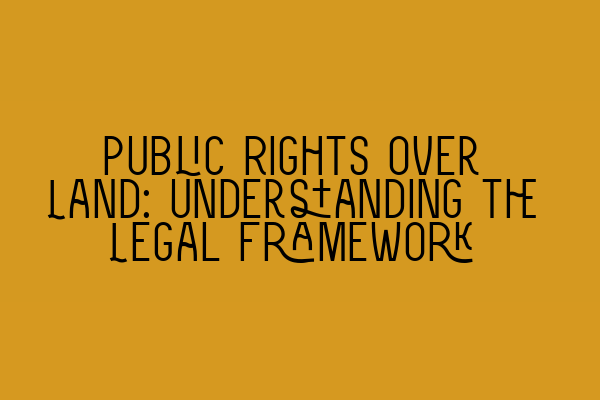**Public Rights over Land: Understanding the Legal Framework**
Welcome to SQE Property Law & Land Law, your trusted source for all things related to property law. In this blog post, we will explore the concept of public rights over land and delve into the legal framework that governs these rights. Understanding public rights over land is crucial for property owners, developers, and even individuals who simply wish to learn more about the intricacies of property law.
Before we dive into the legal aspects, let’s start by defining what public rights over land entail. Public rights over land refer to the various rights and privileges that members of the public may have in relation to certain areas of land. These rights are typically granted by law and allow individuals to access and use specific areas for various purposes.
One common example of a public right over land is the right to access public highways and footpaths. These rights ensure that individuals can travel freely and safely on designated routes without interference from private property owners. The legal framework surrounding public rights over land is complex and governed by a multitude of laws and regulations.
In England and Wales, public rights over land are primarily governed by common law and statutes such as the Highways Act 1980 and the Countryside and Rights of Way Act 2000. These laws outline the rights and responsibilities of both the public and private landowners, ensuring a fair and balanced approach to land use.
It is important to note that not all areas of land are subject to public rights. Some land may be privately owned, and restrictions may apply to access and use. On the other hand, some areas may be designated as public land, where certain rights and freedoms are automatically granted to members of the public.
Examples of public land include parks, common land, and certain coastal areas. These areas are typically maintained by local authorities or government bodies and are open to the public for recreational purposes. Public land plays a crucial role in ensuring that everyone has access to natural spaces and amenities, promoting inclusivity and well-being.
When it comes to private land, the rights of the public can still exist, but they may be subject to certain conditions and restrictions. For example, landowners may be required to grant access to public rights of way, but this access may be limited to designated paths and times. It is essential for property owners to understand their obligations and rights concerning public access to their land to avoid any legal disputes.
In some cases, public rights over land may be extinguished or modified through legal processes such as abandonment, enclosure, or dedication. These processes involve formal legal procedures and may require the consent of relevant authorities or affected parties. It is advisable to consult with legal professionals experienced in property law to navigate these complex processes correctly.
Understanding the legal framework surrounding public rights over land is essential for all parties involved. Whether you are a property owner looking to develop your land or an individual seeking to exercise your rights over public land, having a solid grasp of the legal landscape is crucial.
At SQE Property Law & Land Law, we offer comprehensive courses and preparation materials to help aspiring solicitors navigate the intricate world of property law, including public rights over land. Our SQE 1 and SQE 2 preparation courses provide in-depth knowledge and practical skills necessary to excel in the SQE exams. Don’t forget to check out our related articles for more information on SQE practice exams, preparation materials, and exam dates.
Remember, understanding public rights over land is not only crucial for legal professionals but for anyone who interacts with or owns property. By educating ourselves on the legal framework and staying updated on relevant laws and regulations, we can ensure the fair and equitable use of land for the benefit of all.
